We have been back home for just over a month now! We want everyone to know that just because we are home doesn't mean we're not still involved with our current projects as well as looking for future projects and opportunities.
Our first fundraiser, the silent auction, was a great success so we are going to make it an annual event. We have started organizing the 2012 Streets2Schools Silent Auction. We are also exploring new opportunities for future projects.
Our time in Tanzania was inspirational for both of us and after reflecting over the last month, we are both looking forward to our next chapter. We will of course be focusing on education for street children but are not set on working in one country. Streets2Schools is dedicated to continue supporting the street children of Njiapanda and the Women's Group in Makanya. If you know of a project or centre that works with street children please let us know.
We will keep everyone posted on our future plans and projects and will continue to update our blog and site.
Although Jennilee and I are over here partaking in all the action, we wouldn't have been able to accomplish such great things without your help. We need to give a big thank you to those who have taken the time to follow our progress and contribute to our cause.
We think its important for people in Western society to understand that our work isn't just about Westerners saving the lives of poor people in Africa. It is about empowering local communities and inspiring them to work toward a common goal; having a happy, healthy life, and providing a brighter future for the next generation. Words cannot express how grateful the Tanzanian communities are for us having planted a seed for them to flourish and grow.
There are so many intelligent, business savvy individuals here that have goals and ambitions. They all strive to build a promising future for themselves and their families, but it is the lack of resources that hold them back. The perception that African's don't know how to care for, understand, and help their people is always misconstrued. There have been numerous occasions where we have come across locals who have begun their own projects and are determined to volunteer their time and money to assist their communities. Sometimes it just takes opening the door
This has been such a huge learning experience for us and we hope that it has been for you as well. Thank you again for your support and for helping us plant the seed...
Two weeks ago the father of Grace invited us to his home on July 2nd for her birthday party. We had already planned a small vacation to the coast of Kenya, but were more than happy to ensure we would return just in time for the gathering. On the dalla dalla ride to Njiapanda village we discussed our expectations of what this day would entail. We figured maybe there would be a few of Grace's family members sitting around a table, eating food, and sharing laughs together.
As we approached the house we could hear loud music and became excited at the thought of a potential dance party with some of the locals. We were greeted by a number of Mama's, who grabbed us by the arms and scurried us around the corner of the house. Little did we know, there was a minister preaching to an entire village of people, and a row of chairs set up for us to face the crowd. As the minister announced our arrival, everyone stood up and began cheering. We were completely taken by suprise to find out that not only were we celebrating Grace's birthday, but also they had prepared a celebration of thanks in our honor. For the next couple of hours a number of Grace's family members and locals came forward with prepared speeches about how grateful they were for the work we had done. Because it was a Christian gathering, there was a lot of praying, singing, dancing, and overall feelings of joy and happiness. Jennilee and I were completely overwhelmed, to the point where we couldn't look at one another because we might burst out in tears. All of the Mama's at the party lined up to give us hugs and kisses, and they had even bought us a gift. We truly did feel like Queens for a day!
After the ceremony we proceeded to eat mounds and mounds of deliciously prepared food until we couldn't breath. We figured we should probably be on our way home, as it was nearing 430 pm, and the sun goes down so early in Tanzania. However, when we tried to say thank you and goodbye, the music was turned up and everyone began dancing as if it were their last day on earth. Of course we couldn't help but shake our matako (butt)!
We are so grateful for the lives we live and fully realize that not everyone in the world is granted equal opportunities. Improving the lives of those who need it is one of the most rewarding feelings. It is moments like these that make everything worthwhile in the end!
After two months working alongside our local contractor and his team we have finally completed the construction of two classrooms and a playground for the children. If anything, our experience has taught us that patience truly is a virtue! All of the work was done manually without the assistance of machinery, one of the luxuries we so often take advantage of in Western society. For example, concrete was mixed in a dug up hole in the ground with water and sand, which was stirred with wooden sticks.
Even in Canada there can be setbacks in construction progress. However, when the entire country of Tanzania was out of plywood we began to worry if there would be a divider between the two classrooms. Luckily we were able to order just enough plywood for our project. We waited two weeks for it to arrive, only to be informed that we must pay a "special price". On our first day our contractor left to retrieve sand and mortar for the concrete and bricklaying phase of the building. So we decided to stay back and prepare the site with some of our local volunteers that generously offered their time and efforts. After 2.5 hours passed, Richard (our contractor) frantically ran back to the site, explaining in kiswahili that the Tanzanian authorities caught him taking sand from an uncertified company. He spent the majority of the morning bribing the police to let him bring the truckload to the site, and managed to get away by paying them 50,000 TSH ($30 CND). Jennilee and I looked at one another, shaking our heads while thinking how corrupt the authorities in the entire continent of Africa can be. However, this is the norm here, and bribing is a frequent occurrence in developing countries.
Although it has been a lengthy process, we feel extremely grateful that we were able to find such a great team of workers. Not to mention the fact that we had to dig up an entire acre of land, using old shovels and rakes. Thankfully, a handful of local Tanzanian volunteers were more than willing to give us their time and support our cause. The two classrooms will be an excellent learning environment for the children as there is plentiful space and air circulation. Njiapanda Centre for Street Children are absolutely thrilled about the playground and intend on fully utilizing the field for playing games and activities.
Part 5
With no other plans, we decided to visit the Masai farming land, a further 2 hours into the desert. It took us about forty minutes to get organized; find the car and meet the Mama. We gave the car a tune up on the spot. The car was a model I had never seen before with SPALDING and a basketball on the back window. The doors didn't work, so they always had to be locked or they would swing open. There was no gas cap, we had to find somebody that had an extra one kicking around. The tires were flat so we filled them (and the spare) with air. Filled her up with water and oil and she started up with no kitten purr but some sort of old woman cough. Emmason drove with Laura in the front and Abiq (Emmason’s cousin), the Mama, and me in the back. We drove for about ten minutes into the country when sure enough Mama's yelling out the window at some random truck full of men. A man jumps out and jumps into the backseat with the three of us. A bit too squishy for me so I hopped up front with Laura. It happened to be the owner of the car, but I stopped asking questions awhile back.
There was a road in the beginning which soon opened up to a desert landscape. Following previous motorcycle tracks was the route we followed. We drove through three distinct colours of soil and plant life. Then after two hours we took a sharp right and there was a barrier of thorns blocking what appeared to be the exact same landscape we had been driving through. The guys cleared the thorns and we approached two Masai mud dung huts and a vast farming area. Really cool. They offered honey combs straight from the hive and we walked around eating the smokey sweet combs. One farmer and his wife greeted us in the Masai farming land (which is made of raised beds with little paths a foot high to walk on). The man ran up to Laura said "how much" looked at his wife and said "why did I marry you I have never seen Mzungu before now I want one, I don't want you anymore, you go home". Of course he said this in Masai so Emmason was laughing so hard, the wife was laughing, while Laura eloquently said “I am not for sale.” Good times. Then we asked for a picture and he grabbed her hair and tried to put it on his own head. After walking through banana trees, fields of watermelon, maise, avocado, sugar cane, and onions we headed back to our friend Spalding. We all piled into her but this time there was no old women’s cough as she started up. I said "oh shit" Laura said "how much water is left, we have to ration the cookies we bought." We were in the middle of nooooooooo where. So the owner told us to get out and push, and we did. And Spalding started up with no problems.
We headed to a Masai village. Nobody had seen whitey's before. But they did have a massive satellite dish and we walked into one dung hut where there were twenty Masai watching Manchester United play. We wanted a picture but it wasn't okay to ask. We ate rice and beans for lunch. Then pushed the car to a start and drove to a small river to the second area where Mama could rent land. We had to walk for twenty minutes in the jungle and cross the river by walking (there was croc's in it but they're only at night). At the fields, there were women plowing with babies on their backs and one baby sitting in the shade. He was covered in dirt and flies. So I took a picture and sat down beside him. Then Abiq sat down and talked to him. He only said three things "I want my aunt" "Why are you sitting here, we aren't friends" and "I want some of that food over there, I ate porridge today but now I want something else". It was pretty funny. I thought what a miserable baby, just like the UNICEF commercials, but nope just like any other dirty little boy. Pretty casual. After walking across the river there was a Masai teenage girl with two donkeys gathering water. She had never seen white people or cameras before. She was stunned. Scared shitless, curious, angry, so confused. It was crazy. She didn't like Emmason’s toque so she made him take it off before she would talk. Then we took pictures and showed her and she just couldn't believe it or didn't know or god knows what she thought. It was awesome and the pictures are awesome. She was beautiful when she smiled.
We had some trouble finding the road that didn't exist on our way home. Laura was nervous but in the end we followed some random tracks in the sand and took the bumpy, sketchy Spalding home. We got back home around 630, just before dark. What a day in the life. We were so dirty that Abiq and Emmason were white with dust while Laura and I were black with dirt.
Sunday, we got up early and caught a sketchy, sketchy, sketchy bus. The bus had “The Hunting Knife” across the front windshield. The driver’s side of the windshield had been cracked so severely that I’m not sure how he was seeing anything through it. There was a loud high pitched squeal (kind of like a pig dying) when he used the brakes. There were so many people that Laura was squished into the middle section while I was balancing on a pole that surrounded the driver’s area. At one point I took off my Velcro camera case and the sound was very interesting to the driver. So he started staring at me and the Velcro instead of the road until I started frantically motioning for him to keep his eyes on the prize. The final straw was when I noticed motorcyclists and people jumping and veering out of the way to clear the path for ‘The Hunting Knife’ and its path of fury. Too dangerous so we got off at the nearest city and waited for a better one.
That concludes the five part, weekend away, series.
Part 4
On Saturday we walked through the village, this time with only a small posse of children following. We met with four out of the ten women that made up an HIV Support Group. Before the Pastor and Emmason, all the women were too ashamed to admit or accept their HIV. But after insisting they create a group there are now ten women that meet regularly and share a chicken project. The village has a very large percentage of HIV/AIDS afflicted persons. As mentioned by the two young women, there is no water, no education, no health care, no food, and an overwhelming need for change. There is however, a large manufacturing plant that employs men and women to break up rocks, which get shipped somewhere else to make concrete. The wage is despicable and the working conditions terrible. Because of the dire situation, young girls and women are forced to do whatever it takes for money. This comes in handy for the truckers that often pay the girls and/or women for sex. This is how there is such a large percentage of HIV afflicted people in the village.
Back to the HIV Support Group and our meeting. Three years ago they contacted the government, asking for help with an idea they had for a chicken coup. The government gave 5 Million TSH for chickens and to train the women in how to take care of them. Instead of giving them the money to decide how to spend it, they gave it to the Regional Office, which spent all the money on buying Roosters (not chickens), building a chicken coup, and the remaining on an expensive training seminar that put the money back into their pockets. The corruption in the government is quite apparent here. The women have given up relying on the government for anything. Today, they have around 100 chickens and about 80 chicks. The chicken coup is not used to it's full potential because the women can't afford to feed and water the chickens. So they divide them up between the ten women, they take however many chickens they can afford to feed. Bottom line, the chickens are not going to make anyone a business or even enough to buy food for themselves. They can sell one egg for 12 cents CND. Even if they had a flourishing chicken coup the people that live in the village don't have any money to support the business. With the money the make from selling eggs as well as their own entrepreneurial endeavors, they educate children in the village with HIV, take them to doctor's appointments, buy medicine, and have created a club for any children that want to hang out. Each of the woman has a small side business, such as selling porridge, making meals for anyone, etc. Where there is a will there is a way. With the little money they pull in they somehow manage to help as many others as they can. These women are commendable on many different levels. HIV is often associated with shame, embarrassment, anger, and confusion in any country in the world. This village is no different. Most people living with HIV stay home, they don't talk about it, they are ashamed of this added burden in their life. But these four women, have stepped outside the box. They strive to educate children about HIV, they want to help other women that are widowed and living with it. With acceptance and patience anything is possible. The next time I complain about anything I will think of these women and what they are capable of.
One of the women was a sight to behold. Six feet tall, heavily endowed, massive feet and hands, and a natural at business and organization. She had kept accounts of money, dates, letters, and documentation of everything over the last three years. They even have opened a bank account. After the chicken discussion fizzled out she said "I have a good idea". She knows Masai and can rent one acre of land for 200,000 TSH a year. If they could grow onions on this land they would make 1.5 Million TSH ($959 CND) selling the onions to suppliers. Being the savvy business woman she is, she had already calculated all associated costs of pesticides, mosquito nets for the camp, seeds, boots, tools, etc. All expenses amount to $200 CND. Leaving them approximately $610 CND, enough money to rent the land each year and make a huge difference in their community work.
One thing we appreciated, that was different from other experiences, these women were not asking for help or money. They were empowered women that wanted to do it themselves. More interested in acquiring a loan that they could pay back than simply accepting (or expecting) a signed cheque.
Emmason asked if one day we could visit the Masai and see the land. She was so excited "why not right now, let's go today, we can go today I know somebody with a car". It was only 10:00 AM. And our one task of the day was to meet these women.
Part 3
Emmason had a meeting with two young women that lived in the village. Not knowing what to expect Laura and I tagged along. One was nineteen and one was eighteen. They both had children. They lived at home with their mothers, no men to speak of. I don't know if they were part of the vast majority living with HIV in the village but both their mothers had HIV. They told us the village has no water. So the nearest source of water is a 45 minute walk across the desert. Since there was no water, they couldn't grow their own food. Since they didn't have food or a job, they couldn't afford education. They both had perfect grades and qualified for secondary school but one had gotten pregnant at 15 and the other didn't have the money. So now they both walk 45 minutes to buy a bag of tomatos for 20,000 TSH they then sell them over the week and make a profit of 5000 TSH to feed their mothers, children, cousins, and whoever else lives with them.
An interesting situation. Unlike the people in Moshi, or at the centre we work at, these people felt hard done by. Their eyes held the wisdom of an old lady but they both laughed and had physical appearance of young women. They knew they had it tough. Emmason asked us for ideas. I had none. Build a well. Change locations. When there is a community impacted negatively by every aspect of the social spectrum there is no answer, and definitely no easy answer. We made plans to meet the next morning at 7:30 with their mothers and two more 'Mama's.
Part 2
We stayed at Emmason's parents place. His father is a pastor and social worker and had a calling to come help this village. Three years ago, his wife and him moved there and since then have started a school, a soccer program, and provide their home as a drop in centre for anyone and everyone. Their home consists of a main building with three bedrooms, a kitchen, and a living room. Attached to that is the bathroom, chicken coop, and a room for a fire. Sounds big, sounds nice perhaps. This house was definitely a happy home. But as far as western standards go, it would be considered an extremely poor person's home. The chickens were just as welcome inside as they were out. There was no shower, no electricity and they were one of the only people in the village with a well. Their home was constructed from cement/or bricks that resemble concrete. There was always at least one street kid and a woman sitting out front, just waiting for a chat with anyone. We shared our room with a rat the first night. The more the merrier?
Part 1: Getting there
On Friday, we took a beat up, broken down greyhound sized bus for two hours. Heading south east of Moshi to the village of Makanya. The buses are definitely scary, but it's the main mode of transport besides getting a lift on the back of a motorcycle, which is even scarier.
Going to the bus station can only be compared to entering what would be considered a heated argument in Canada. As soon as you step into the bus depot vicinity, it's at least five men in your face hassling. "Taxi" "Bus" "Arusha" "taxi" Mzungu" "Mambo" "Poa", etc. etc. This process is not exclusive to foreigners, it's for every single person at the bus station, man, woman, and child. Intensity.
Then, one of the yelling men will run up and all of a sudden you have four tickets to some village in the middle of no where. But you can't just get on any bus, first Emmason had to see the bus, do a quick inspection. He said a couple of years ago, they would take engines from huge semi's and put them in buses so that no matter the weight or amount of humans it could still fly down the highway (I imagined warp speed and stars flying by all blurred into strips of light). After he approved of the bus and we had the tickets, it still was not time to actually board the bus. For some unknown reason, we stood in front of the bus while five men yelled in each others faces flapping tickets and money around. We just stood there for ten minutes, holding our backpacks extra tight and taking it all in. I think men speaking Swahili might just sound angry to an English speaking person. Or they like to seem angry but they smile just as quick. Who knows, finally we got on the last four seats at the very back of the bus. We hit warp speed almost immediately after reaching the highway. So fast. The bus itself is just an old hollowed out shell of what was once some sort of Chinese bus. They look like the buses from the 50's in America with the metal rails that you put your stuff up top on. Once they get going they don't stop they just honk and assume that everyone else should get out of their lane. On a two lane highway it's a bit hairy at times. Then they go for the pass onto oncoming traffic. My word. It stopped three times to pick up more people then the standing room permitted. At every stop women with baskets of stuff on their heads come up to the window and demand you buy something. Or men run up making kissing noises trying to sell gum and cigarettes. Madness, I say. Two and a bit hours later and we made it to the village.
Within five minutes, every child in the village (and perhaps surrounding region) had found us and were following us around yelling Mzungu. It was the first time many people in the village had met white people. My family was worried about problems with mob mentality if there was an election while in Africa. The closest I've come to death was being mauled by hundreds of screaming children. Emmason brought a soccer ball which blew the kids minds. I brought the trusty Nikon which was a hit.
|
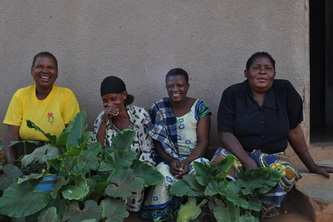
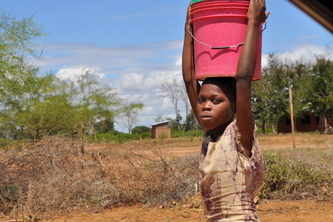
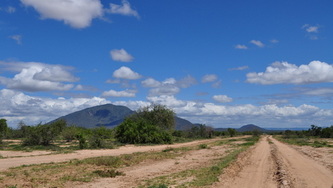
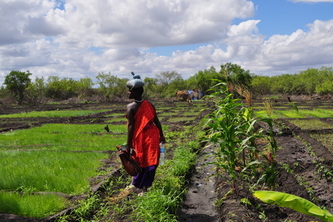
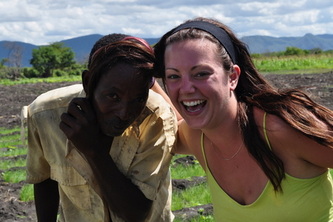
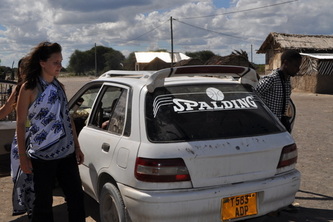

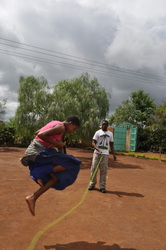
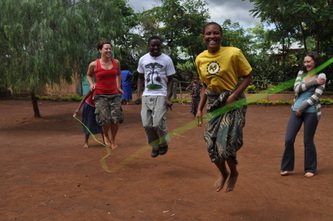
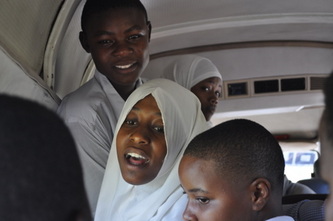
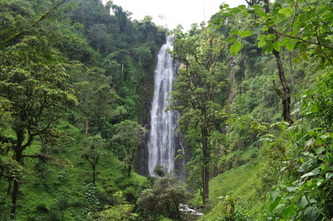
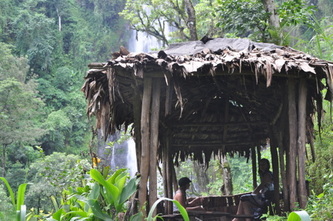
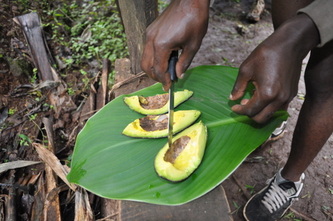
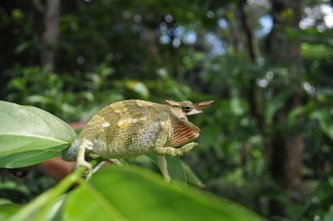
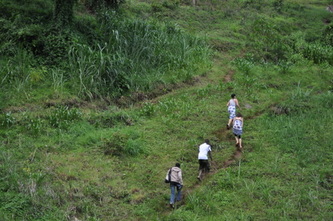
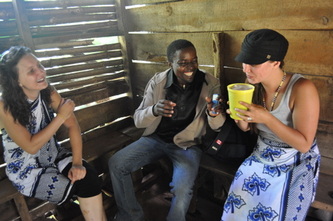
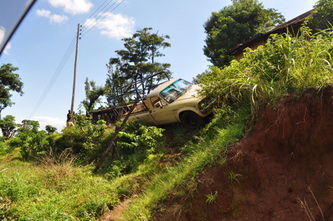
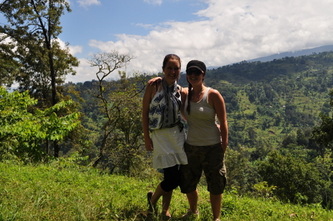
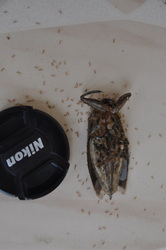
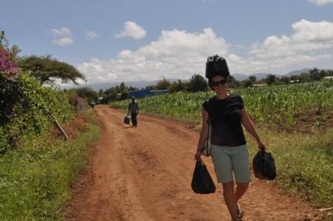
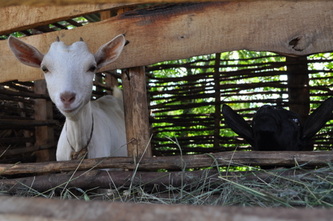
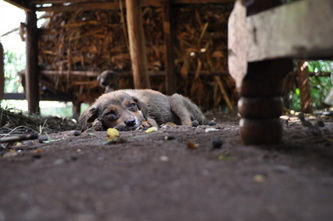
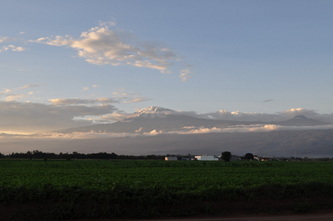
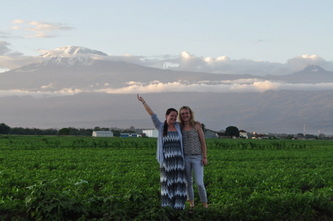
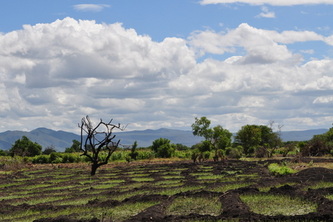
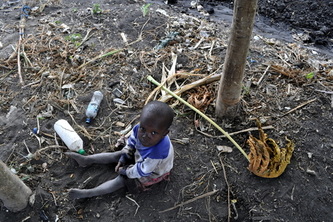
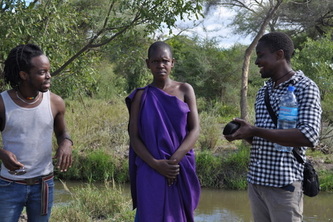
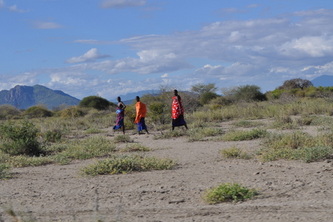
 RSS Feed
RSS Feed